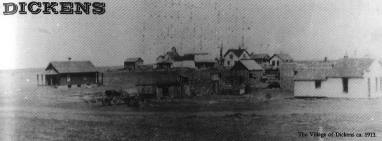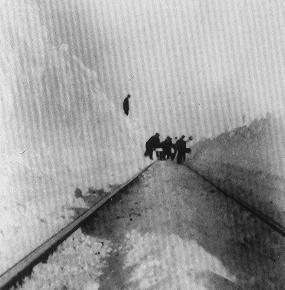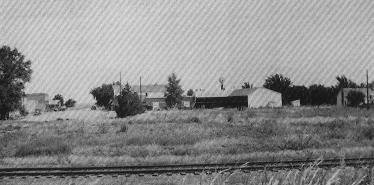
Dickens owes its existence to the Burlington Railroad (CB&Q) line, built through southern Lincoln County in the 1880s. The farmers and homesteaders around this area helped with leveling, grading, and laying the track during the two years it took to complete the project. New settlers were arriving and staking out claims under the Homestead Act. With work on the railroad, this was obviously "a growing community." Later, because of the distance between the towns to the east and Wallace to the west, Dickens was made a "flag" station. When there was traffic from the other direction or some other emergency, the train was "flagged" to stop.
The railroad company built the coal chutes, put in a well, and erected a large water tank to service the locomotives. A large two-story depot was built with living quarters upstairs for the depot agent and his family. A post office was established in 1888. The mail and freight came in on the railroad. The town was officially platted in May 1889 by the Lincoln Land Company, and J.W. Anthes put up a general merchandise and grocery store. An eight-room hotel was built and dray service to haul freight and baggage from the depot was established. When a second grocery store came in, the grocer also ran a huckster wagon on a route out in the country. The man hired to drive the team and wagon would buy butter and eggs from the farmers, and sell non-perishable staples such as sugar, cornmeal, flour, and coffee.
It was about this time that there was a real flurry of building and growth in Dickens. The stockyards by the tracks were enlarged. A large new store was built and the lumber yard expanded, adding more sheds. A feed store, drug store, and hardware store were also built. (The hardware store also handled undertaker supplies.) The First State Bank of Dickens was also organized in 1915, and a building constructed. By 1917-20 the population had increased to about 250 people. Our town of Dickens was a hustling-bustling place in those days. Everyone was busy. The trains arrived and departed, and people went about their daily tasks with dedication and purpose. Then "hard times" came. After the days of the dust bowl, many people left town. The bank closed, businesses folded, and the town looked forlorn and abandoned. Good roads to larger towns and a lack of local services helped to put small towns out of business. The depot was torn down in 1951, there was a disastrous fire in 1957 that burned several business places, and the big store was torn down in the 1960s. With declining enrollment in school, the district merged with Wallace in order to provide an education for the children. Since then the school building and land has been sold. Our little town of 20 still has a post office, but that's about it. Our centennial year will perhaps be our last. There are no big activities planned but a book, "A Century of Memories," is being prepared.
Later in 1980, Charles Kuralt came to Dickens and broadcast a show on CBS about the incident. We received many letters and a number of tourists who came by to see "the town in Nebraska bombed during World War II." By Eilene Gartrell, Dickens, NE 69132 "A Century of Memories," soon to be published. |
| Copyright NEGenWeb |
 DICKENS --
LINCOLN COUNTY
DICKENS --
LINCOLN COUNTY  The station
was named "Dickens" by an official of the land company
who was supposedly an admirer of the English writer
Charles Dickens.
The station
was named "Dickens" by an official of the land company
who was supposedly an admirer of the English writer
Charles Dickens. With homes and
families established in the community, a school was
needed. Lincoln County District 60 was organized in
March 1889. A small frame schoolhouse was built. The
teacher's salary was $20 for a three-month term. There
were few books available. This first building burned,
as did the second frame school. In about 1915-16 a
cement tile school building was erected.
With homes and
families established in the community, a school was
needed. Lincoln County District 60 was organized in
March 1889. A small frame schoolhouse was built. The
teacher's salary was $20 for a three-month term. There
were few books available. This first building burned,
as did the second frame school. In about 1915-16 a
cement tile school building was erected. If Dickens has
a claim to fame, it is that our town was "bombed" in
World War II. Bombers based at McCook flew a "practice
bombing range" northeast of Wallace. On one practice
run, several bombs were actually dropped over Dickens.
One went through the lumber yard roof. Fortunately,
the bombs did not have explosives in them and no one
in Dickens was hurt.
If Dickens has
a claim to fame, it is that our town was "bombed" in
World War II. Bombers based at McCook flew a "practice
bombing range" northeast of Wallace. On one practice
run, several bombs were actually dropped over Dickens.
One went through the lumber yard roof. Fortunately,
the bombs did not have explosives in them and no one
in Dickens was hurt.